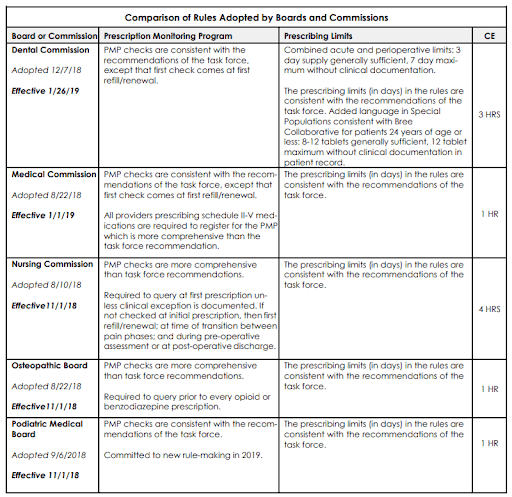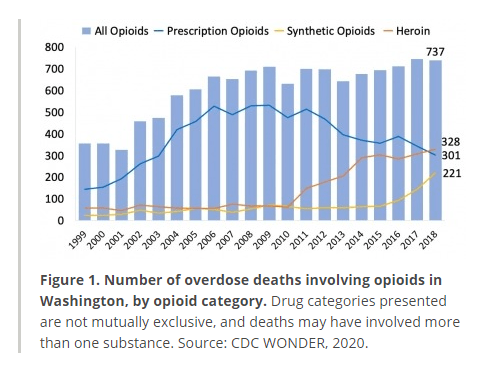Article

According to the Washington State Department of Health, in 2017, the Washington State legislature enacted House Bill 1427 into law, which directed five health care prescribing boards and commissions (medical, dental, nursing, osteopathic and podiatric) to adopt opioid prescribing rules by January 1, 2019.
To promote consistency, the Department of Health (DOH) convened a task force with representation from each health care prescribing board to develop a common set of recommendations for rule-making. Two members from each board or commission, including two ex officio members from the Pharmacy Quality Assurance Commission, held seven all-day meetings around the state between September 2017 and March 2018. The task force makes the following recommendations.
Registration is required for a prescriber who intends to prescribe opioids. The PMP must be checked in the following situations:
Prescribers may only exceed the following limits with clinical documentation in the patient record:
However, each of the 5 boards and commissions has independent authority to adopt rules. This means that, while the rules ultimately adopted by each are substantially similar to the task force recommendations, there are some key differences. Here is the comparison list published by Washington’s DOH in 2019:

As reported by the National Institute on Drug Abuse (NIH), in Washington State in 2018, an estimated 63% of drug overdose deaths involved opioids.

The University of Washington has reported that the total number of drug-related deaths involving opioids in 2019 was 852, whereas 2020 saw a 43% increase to 1,219. Controlling for population growth, the annual rate of opioid deaths changed little from 2005 to 2018, and recently the rise of synthetic opioids, namely fentanyl, have contributed to increases in deaths involving non-heroin opioids.
Additionally, “Crime lab data for police evidence testing indicate a 186% increase in the number of cases positive for opioids statewide between 2002-2004 and 2018-2020, with increases in most counties. Publicly funded drug treatment admissions for opioids as the primary drug increased 257% statewide between 2002-2004 and 2013-2015 (the last year available), with increases in 38 of 39 counties. Drug-caused deaths involving opioids increased 71% statewide between 2003-2005 and 2018-2020, with increases in most counties. These increases in counts far exceed population growth.”
The Washington State Department of Health provides a variety of opioid prescribing toolkits on their website, which include specific toolkits for the public/patient and specialties like dental, medical, nursing, osteopathic, podiatry, pharmacist.
Find the Right Opioid Prescribing Toolkit for You
The goal of these toolkits is to provide practitioners, providers, and other healthcare industry professionals with the information they need to understand current and future opioid-related requirements.
Find Additional Opioid Prescribing Resources
Patient health and well-being are a provider’s number one priority. No matter the state, law, rule or medical guidelines we encourage providers to consider the following these items when prescribing opioids in the state of Washington:
Given the rise in opioid-related deaths in Washington State, combined with updated policies in recent years, navigating the complexities of complying with laws and guidelines providers must follow can be tedious and frustrating. At DRUGSCAN, we specialize in a proactive approach to protecting patients and their providers who prescribe opioids with Prescription Drug Monitoring services.
Toxicology screening is the only measure for monitoring patient opioid use that is objective and scientific in nature. Utilizing toxicology screening, we can measure what the patient actually took and how much of it is in their body.
DRUGSCAN acts as an extension of the patient care team, helping providers in large hospital systems and private offices alike with tools necessary to safely distribute and monitor the delivery of opioids.
Contact us to learn about our testing services, like Prescription Drug Monitoring, that helps you make critical decisions regarding your patients, quickly and efficiently.